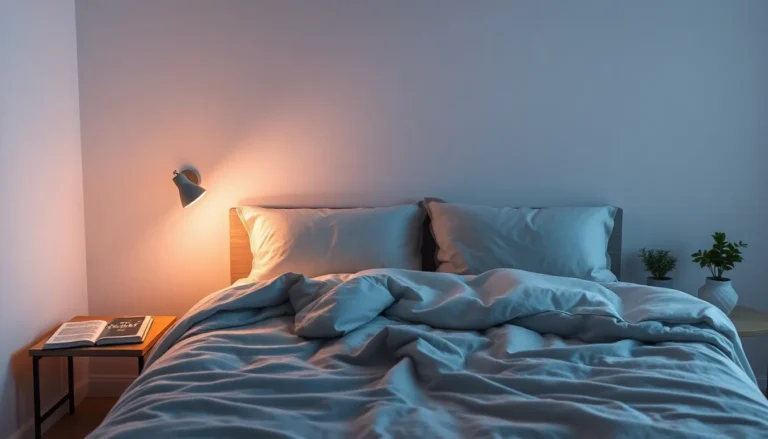Table of Contents
ToggleIn a world where Netflix binges and late-night scrolling reign supreme, catching quality Z’s often feels like a distant dream. Yet, sleep isn’t just a luxury; it’s a necessity. Without it, mornings can turn into a real-life horror show—think zombie apocalypse but with coffee stains and mismatched socks.
Imagine waking up refreshed, ready to tackle the day like a superhero. The secret? Mastering the art of sleep. It’s time to trade in those restless nights for peaceful slumbers. With a few simple tweaks, anyone can unlock the door to better sleep. Get ready to discover how to transform your nightly routine into a sleep sanctuary, where sweet dreams are just a wink away.
Importance Of Sleep
Sleep stands as a fundamental aspect of health and well-being. Its significance extends beyond mere rest, impacting various bodily functions.
Benefits Of Quality Sleep
Quality sleep boosts cognitive function. Improved memory retention enhances learning capabilities, making daily tasks easier. It also strengthens the immune system, helping the body resist illnesses. Sufficient sleep promotes emotional stability, reducing irritability and fostering a positive outlook. Additionally, maintaining a consistent sleep schedule lends itself to healthier sleep patterns, creating a more refreshed and energetic feeling throughout the day.
Consequences Of Poor Sleep
Poor sleep leads to serious consequences. Chronic sleep deprivation often results in diminished cognitive performance, increasing the risk of accidents. Mood disturbances frequently arise, contributing to anxiety and depression. Lack of adequate sleep weakens the immune system, leaving individuals vulnerable to infections. Furthermore, persistent poor sleep is linked to long-term health issues, such as obesity and cardiovascular disease. Prioritizing sleep is crucial to avoid these detrimental effects and to support overall wellness.
Factors Affecting Sleep

Various factors impact sleep quality. Understanding these influences helps individuals create more conducive sleep environments.
Environmental Influences
Noise levels significantly affect the ability to fall and stay asleep. Sudden interruptions can disrupt sleep cycles. Light exposure also plays a crucial role; bright lights hinder the production of melatonin, a hormone essential for sleep. Room temperature affects comfort; too hot or too cold can lead to restlessness. Quality of bedding contributes to sleep satisfaction; comfortable mattresses and pillows support proper alignment and relaxation.
Lifestyle Choices
Dietary habits influence sleep patterns. Consuming heavy meals or caffeine close to bedtime can disrupt restful sleep. Physical activity promotes better sleep; regular exercise helps regulate circadian rhythms. Sleep schedules impact rest quality. Following a consistent bedtime routine signals the body when to wind down. Stress management techniques also improve sleep; practices like meditation or deep breathing reduce anxiety that can hinder sleep onset.
Tips To Sleep Better
Optimizing sleep quality requires focused efforts in various areas. The following tips aim to enhance nightly rest.
Establishing A Sleep Schedule
Consistency is crucial for better sleep. Going to bed and waking up at the same time daily regulates the body’s internal clock. This practice improves sleep quality and minimizes grogginess. Gradually adjusting sleep times helps ease transitions for those with varying schedules. Tracking sleep patterns through apps or journals provides insights into personal habits, identifying necessary changes for better rest.
Creating A Restful Environment
Environmental factors significantly influence sleep quality. Keeping the bedroom dark promotes better slumber, as light exposure can disrupt circadian rhythms. Noise reduction with earplugs or white noise machines can help block disturbances. Maintaining a comfortable temperature, typically between 60°F and 67°F, enhances sleep quality. Choosing supportive pillows and mattresses contributes to overall comfort. Personalizing the space with calming colors and minimal distractions creates an inviting atmosphere for sleep.
Incorporating Relaxation Techniques
Relaxation techniques prepare the mind and body for sleep. Engaging in practices like deep breathing, meditation, or gentle yoga calms the nervous system. Establishing a bedtime routine that includes reading or taking a warm bath signals the body it’s time to wind down. Limiting screen time before bed reduces blue light exposure, promoting natural melatonin production. Regular practice of mindfulness enhances relaxation, making it easier to fall and stay asleep.
Common Sleep Disorders
Sleep disorders significantly affect overall well-being. Understanding these conditions helps in seeking appropriate remedies and improving sleep quality.
Insomnia
Insomnia is characterized by difficulty falling or staying asleep. This disorder can stem from various factors such as stress, anxiety, or certain medications. Chronic insomnia may lead to daytime fatigue, irritability, and difficulty concentrating. Research indicates that insomnia affects nearly 30% of adults, making it crucial to seek solutions. Cognitive behavioral therapy often proves effective in treating insomnia, as it addresses underlying issues and promotes better sleep habits. Establishing a bedtime routine can also help signal to the body that it’s time for rest.
Sleep Apnea
Sleep apnea involves repeated interruptions in breathing during sleep. The most common form, obstructive sleep apnea, occurs when throat muscles relax excessively. Symptoms include loud snoring and daytime sleepiness. The Centers for Disease Control and Prevention (CDC) reports that sleep apnea affects around 25 million adults in the U.S. Untreated sleep apnea increases the risk of serious health problems, including high blood pressure and heart disease. Continuous positive airway pressure (CPAP) therapy often alleviates symptoms by keeping the airway open during sleep. Adopting a healthier lifestyle may also mitigate the effects of this disorder.
Prioritizing quality sleep is essential for overall health and well-being. By understanding the factors that influence sleep and making simple adjustments to nightly routines, individuals can significantly improve their rest. Creating a peaceful sleep environment and establishing consistent habits can lead to better cognitive function and emotional stability.
Addressing common sleep disorders like insomnia and sleep apnea also plays a vital role in achieving restorative sleep. With the right strategies in place, anyone can transform their nights into a time of rejuvenation. Embracing these changes can pave the way for a healthier and more vibrant life.







